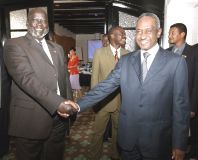Sudanese belligerents sign landmine clearance accord
NAIROBI, Kenya, Dec 1, 2004 (PANA) — The Sudan government and the main rebel
groups in the south Wednesday signed an agreement to use a common strategy in clearing landmines, which have infested 30 percent of the country’s territory.

|
|
John Garang, and Ali Osman Taha shake hands, Thursday, Oct.7, 04, during the opening of the fifth session of the high level consultative meeting on the Peace Talks in Nairobi (AP). |
Speaking after the signing ceremony in Nairobi, Sudan’s
Humanitarian Minister Ibrahim Mohammed said that Khartoum
considers the clearing of the landmines a “humanitarian issue.”
Sudanese government officials and those from the Sudan People’s
Liberation Army/Movement (SPLA/M) described the large
concentration of landmines as the biggest stumbling block to
effective aid delivery in the country’s southern part.
“Landmines contamination in Sudan is the greatest obstacle in
our endeavours to proceed with the peace process, since an
approximated 30 percent of the country is already contaminated,”
Mohammed said.
SPLA/M Representative at the Nairobi Summit on a Mine Free World,
Jurkoch Barach, said his group prioritises the eradication of
landmines for the safe return of people to their villages in
southern Sudan.
The belligerents expressed optimism that with the signing of a
peace accord by the end of the year, mine clearance would become
the biggest challenge to the peaceful resettlement.
“Mine clearance will pave the way for the displaced citizens,”
the SPLA/M mine expert said.
The agreement was signed on the fringes of the ongoing Nairobi
Summit on a Mine-Free World, which entered its third day
Wednesday.
Sudan’s borderlines to north west is heavily infested with the
landmines left behind during the Second World War, making it very
risky to some 600,000 Sudanese refugees who are expected to begin
filtering in from neighbouring countries.
Mohammed said removing the landmines was crucial in enhancing the
repatriation of millions of displaced southern Sudanese civilians
who fled during the last 21 years to escape fighting.
The signatories expressed their intention to have a capacity
building for National stakeholders opening of regional mine
action offices and link mine action with development and poverty
eradication once the long-awaited peace is achieved.
“Landmines clearance is on top of our agenda in terms of
realisation of final peace settlement for both of us; the
government and SPLAM. Four million Internally Displaced Persons
and an estimated 500,000 refugees are expected to return to the
ir homeland,” Mohamed said.
Sudan is one of the 144 signatories to the Ottawa Convention of
1997, having endorsed it in July 1997 and ratifying the accord
several months later, in spite of the raging conflict.
Meanwhile, the United Nations Director of Mine Action Service
Martin Barber commended Sudan for its commitment to clear
landmines by 2014, and to destroy all mines by 2008.
Barber said landmines affected food security for about two
million people in Sudan, and hoped that their removal would
improve people’s access to better farming lands, so as to become
food self-sufficient.
